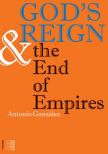After Eden
Antonio González, a Spanish theologian who worked for a number of years in Guatemala and El Salvador, is presently on the instructional staff of the Fundación Xavier Zubiri, a teaching and research center in Madrid. (Zubiri was a Spanish philosopher whose thinking had a profound influence upon Ignacio Ellacuría, S.J.) An earlier work, The Gospel of Faith and Justice, appeared in 2005; a number of other titles have not yet appeared in English.
The eight chapters that make up God’s Reign & the End of Empires are, in effect, a course in theology—and a very good one. The overall perspective of the book is liberationist; its theological feet are planted in the historical experience and social reality of people struggling under the weight of economic and political “empires.” By empires González means all those social, political and economic forces that adversely affect individuals and their communities—forces that dehumanize by wounding or destroying relationships, families, whole societies and the planet itself.
Chapter One sets the stage by describing and analyzing the economic and ecological crises the world faces today. Chapter Two interprets the cause of these crises from a biblical perspective, zeroing in on the sin of Adam. Throughout the book González refers to “Adamic logic” as the root cause of humanity’s moral disorder, meaning the human proclivity toward self-justifying thinking and acting. On one level, this proclivity shows itself in the belief that by living righteously and obeying the moral law, human beings convince themselves that they somehow earn God’s blessing, that their worth depends upon the success of their endeavors and that human action can bend the divine hand toward benevolence; Saint Paul understood this problem very well.
But there is also a second level. “The quest for self-justification is an attempt to replace God,” González writes. “The endless competition with others, the desire to obtain ever greater results, the obsession with growth and production” or “to justify ourselves by the fruits of our own praxis” belongs to the logic of self-justification. All this leads to structures of domination, for which capitalism is the boldest expression. “The Adamic logic is pervasive and enduring; no age or region escapes its grip.”
González then moves, in Chapter Three, to the divine response to human waywardness; God reveals the way to escape from empire. The escape route from poverty and injustice is the “dynamic reality” of God’s reign, the formation of a society that will be “radically egalitarian and truly fraternal.” This leads into a long chapter on the mission of Jesus, his radical social praxis, the meaning of his death and the creation of a way of being together not marked by alienation and oppression but by reconciliation, freedom and love.
The real strength of the book lies in the last four chapters. With their focus on the new community (and the new humanity) that the Spirit of Jesus makes possible, these chapters are a genuine contribution to a contemporary theology of the church. Some people mistakenly believe, González argues, that whereas salvation has a social face in the ministry of Jesus, it assumed a far more spiritual face after his death and resurrection. Not so. He writes, “The social praxis of the first Christians...kept as its horizon the liberation of the Exodus as this was radicalized by Jesus.”
Chapter Five examines the earliest Christian communities. González calls them messianic because they preserve, clearly and deliberately, the praxis of Jesus. Just as Jesus’ praxis contained an implicit rejection of empire, so too did the life and practice of the early communities. Through the evangelical nature of their family life they were proclaiming God’s reign, and God’s reign subverts Caesar’s and every empire afterwards. He writes, “On the basis of the household, it was possible to constitute a social network different from those of the larger society.” And with that social network came a brand new way of thinking about how society could be shaped.
Chapters Six, Seven and Eight work out the implications of conceiving the church as messianic communities: the relation between believing communities and the state, the emergence of what González refers to as “popular economy” and how Christian communities might continue to live out Jesus’ mission in a world that does not share their beliefs. His discussion of the state’s tendency to divinize itself (and thus force a choice) is thought-provoking. He writes: “On this planet there does not exist the state that does not require oaths of fidelity, that does not organize cultic ceremonies to its flags and symbols, that does not periodically require the sacrifice of human lives, that does not build ‘altars of the homeland’, or that does not erect great statues to its violent founders.” The book’s second half would make excellent reading for a course on social ethics.
Experience in the classroom has taught me that when it comes to studying the Gospels, perhaps it’s best to start at the end, that is, with the resurrection. After all, Easter is the perspective from which the Evangelists wrote. In the case of God’s Reign and the End of Empires, instead of beginning with primal disobedience and the manifestations of Adamic logic, perhaps the Easter experience of the first communities would have furnished a more engaging starting point. Domination and oppression are real and pervasive, no matter how the biblical writers may have accounted for their origin. Adam does not necessarily take us to Jesus. But the Easter experience and its transforming effects within individuals and communities were anything but ordinary. And Jesus sooner or later takes us back to the sorry effects of Adam’s choice. Nevertheless, it would be easy to structure a great course around this book.
This article also appeared in print, under the headline “After Eden,” in the May 20, 2013, issue.








